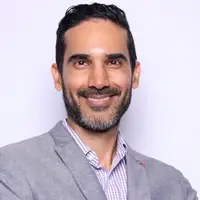
Look no further than CFP’s free hour-long webinar, “From Burnout to Balanced,” available to view at your convenience. Get tips that immediately release stress—within seconds!—and strategies to achieve lasting equilibrium both at work and at home.
Two expert consultants, both licenced pharmacists, and two pharmacy owners shared their recommendations and personal experiences during the live webinar on November 8:

Amy Oliver, CEO of Amy Oliver + Co

Manjit Hansra, Principal Consultant, M. Hansra Family Healthcare

Laura McDonald, Epic Pharmacy in Tofino, B.C

Sandy Faheim, owner of four pharmacies in Ontario
Click here to watch it on your own time, and read highlights here.
In 2019, the World Health Organization recognized burnout as an “occupational phenomenon” characterized by three factors: energy depletion or exhaustion; negativism or cynicism; and reduced professional efficiency.
“In our world [reduced efficiency] can manifest as an overwhelming inability to make decisions, a sense of helplessness, or potentially even a surge in errors,” said Oliver.
Societal influences that revolve around stereotypes and self-perceptions contribute to burnout among pharmacists. For example, the stereotype that pharmacists are always available, can serve people immediately and have all the answers. “This can lead to perfectionist mindsets among pharmacists…and the pressure of perfectionism creates anxiety and stress,” noted Oliver.
Pharmacists may also become workaholics and neglect personal passions to meet unrealistic expectations, resulting in a feeling of unfulfillment.
The first step to recover from burnout and move toward work-life balance is a change in attitudes. “The thing about stereotypes is, when you can identify when one is impacting you and actually name it, you’re more likely to then deal effectively with it and move forward,” said Oliver. “It’s absolutely acceptable to have limitations, to set boundaries and seek help.”
She added that pharmacy owners and head offices play a critical role in “challenging some of the unrealistic expectations and stereotypes.” For example, one proven strategy is to manage the overachievers on staff first. “It might seem counterintuitive, as we often rely on these superstars to maintain really high standards and hold everything together, but many overachievers struggle to set healthy boundaries at work…. And this makes them particularly vulnerable to burnout.” At the individual level, Oliver urged pharmacists “to nurture the parts of yourself that exist outside the world of pharmacy. You’re allowed to prioritize self-care, you’re allowed to put yourself first.”
Manjit Hansra successfully ran a large pharmacy for more than 18 years—and left it behind without looking back in 2022. He was burned out. After attending personal wellness retreats in five continents, he dedicated himself to helping fellow healthcare professionals recover their well-being and work-life balance.
Breathwork is a big part of what he teaches to individuals and organizations. “It’s essentially just various breathing techniques that help to regulate our nervous system and promote physical and mental relaxation,” said Hansra. “When we breathe effectively, we can really maximize that oxygen exchange to get to our tissues and to our brain, to respond in the moment with awareness.”
Hansra described the three types of breathwork—functional, nervous system regulation and transformational. Functional breathwork is how you breath from moment to moment. Most people take 14 or 15 breaths a minute—the optimal numbers is six breaths (inhale for five seconds, exhale for five seconds).
During the webinar, Hansra demonstrated two exercises that help respond to stress: box breathing, recommended during times of transition—for example, when shifting your focus from dispensing to counselling—and the physiological sigh to recover from a situation that “really spikes your heart rate,” such as a difficult interaction with a patient.
“The beauty of breathwork [is] it’s very simple. It’s very practical,” summarized Hansra. “We’re not saying, spend 20 minutes meditating. We’re just saying spend 30 seconds during the transitions throughout your busy day. And if you do that, and practice it consistently, you can find some really long-lasting benefits.” When asked how to get into the habit of breathwork, Hansra—who still works part-time in community pharmacy—used himself as an example. “When I started, I used the Alarm feature [on my phone]. Then I got to the point where I could remember on my own. Then what I did, say for example I was giving someone a vaccine…I would do three five-second breaths in and five-second breaths out. It’s a matter of looking at your environment and seeing the opportunities to be more aware in the moment.”
Work-life balance is not just part of the business model for Laura McDonald, it is the business model for Epic Pharmacy.
“We have a really strong employee value proposition and that means not only compensation and benefits, not only career stability and development, but also ideas around our company culture, our purpose and our mission, and most importantly our work-life balance,” said McDonald.
More specifically, the business model is holocratic, which means there is no hierarchy and there are “defined systems that allow every individual in the company to operate as a bit of a centre. No information is too little or too much in this environment and there are clear pathways that relay this information,” explained McDonald. “We find it really it helps streamline things and it doesn’t allow things to wait on people because there’s an outlet to communicate [when something] isn’t quite working.”
Over time, people’s roles and responsibilities become more clearly defined. In practical terms, this has led to crossover training, more flexibility in roles, more professional growth, longer times off for vacations and shorter work weeks.
“Most of my staff work an average of four-day work weeks. We’re very flexible with unpaid time off—my front store manager just got back from a six-week dream trip,” said McDonald.
Technology is a key enabler of the holocratic way, namely in the form of an internal communications system. “We do not have a texting culture. We have an internal chat that’s dedicated and there’s a commitment to log on to this system…. It’s also used for beautiful and fun photos and memes and the things that create a good culture,” said McDonald.
In addition to the internal chat for work-specific communications, McDonald implemented a “talent management system” for human resources, the dispensary is paperless and uses pill counters, and self-checkout kiosks are a popular option for customers.
Put all this together and the pharmacy team is equipped to “roll through” whatever new venture or challenge comes its way, be it prescribing for minor ailments or working during a natural disaster. “Because we have that foundation, nothing seems over challenging. We have a clear way to tackle everything.… [That] really helps with the day-to-day lives of my staff, which contributes to them having better and more fulfilled lives outside of work.”
Sandy Faheim, owner of four medical clinic-based pharmacies in Ontario, presented four main tenets to help pharmacy owners strive towards work-life balance for their staff and themselves.
Get curious – Learn more about the people on your team, such as career goals, family needs and outside interests (including side hustles). “It’s really important to get to know what life stage that they’re in because understanding that can provide us a lot of insight into how to create value for them,” said Faheim.
Be flexible – Be open to non-traditional hours and non-traditional roles, advised Faheim. She used the example of an employee who was recovering from social anxiety. “She really insisted on keeping working because it helped her feel better, but she preferred to come in before or after our operating hours. She was so grateful that we could support her during that short period. It showed her how much we do care about her personal life and that her health is the priority.”
Openly communicate – Faheim starts each day with a brief team huddle and makes sure to set aside time for group discussions about scheduling preferences and vacation times. “I find that when we discuss it openly…it feels more like we’re working together because we know we have to hold down this fort of the pharmacy. It shows everybody that you’re an essential part of the team, but your time off is also very valued and encouraged.”
Practice what you preach – Pharmacy owners and managers have to take care of themselves first before they can help staff with work-life balance, stressed Faheim. That means not “working 24/7 or feeling we have to be productive at all times.” It means sharing things about your life with staff, letting them know what you enjoy outside of work—and scheduling those things in your calendar as you do work meetings. For Faheim especially, it meant letting go of the need to always be at the pharmacy. “I would always imagine a fire that only I could put out if I was physically there.” She learned to delegate, which enabled other staff members to develop new strengths. Bringing in experts and implementing new technologies also helped her establish personal work-life balance. Be sure to check out the webinar here — including our panelists’ answers to the question about how employees can speak with employers who aren’t making work-life balance a priority.
As part of its annual Changing Face of Pharmacy report, the Canadian Foundation for Pharmacy...
The federal and provincial governments have enacted a wide range of temporary laws, regulations...